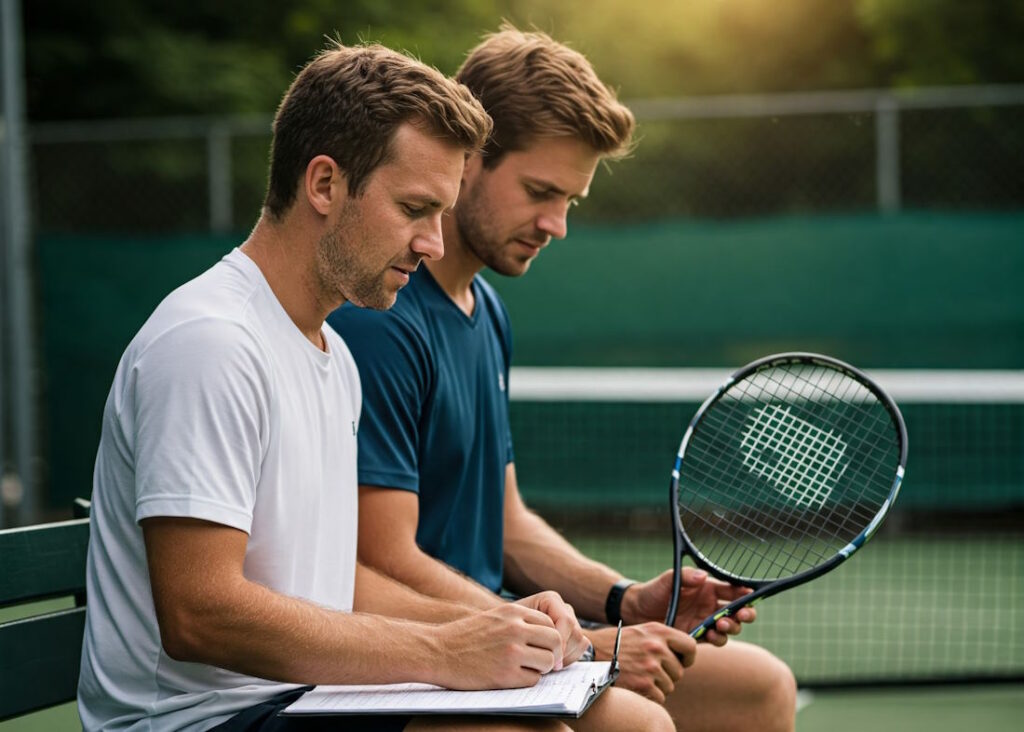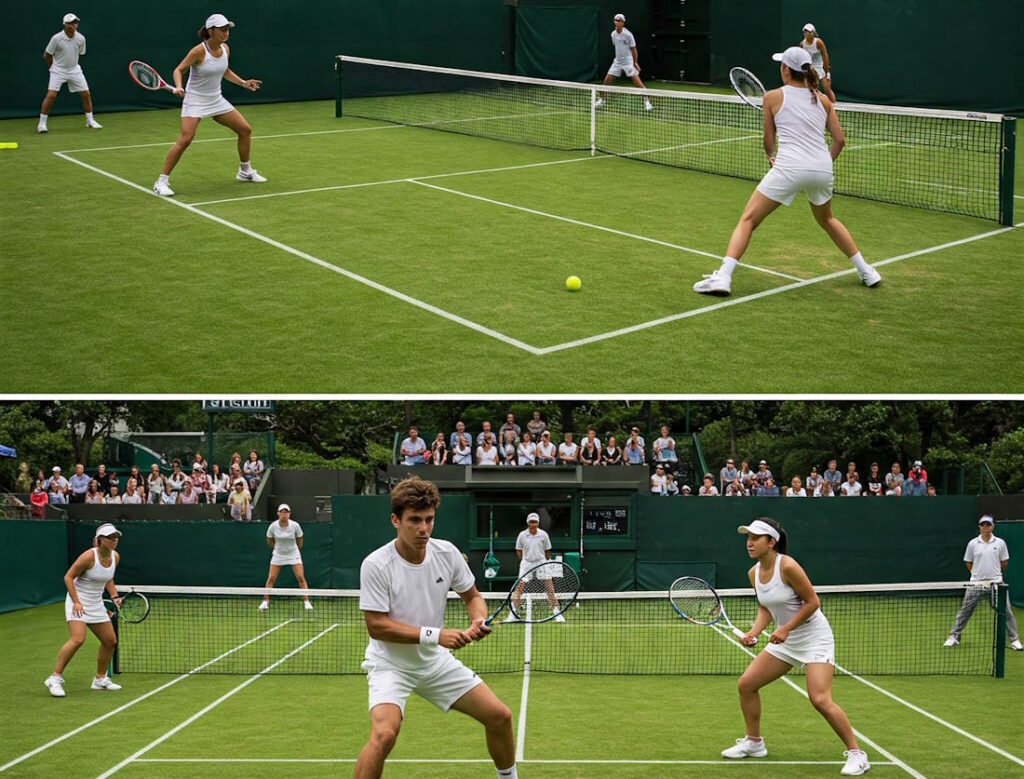Introduction to Sports Psychology in Tennis
Sports psychology is a specialized field that focuses on the mental and emotional aspects of athletic performance, particularly relevant to competitive sports like tennis. In this high-pressure environment, where physical prowess meets intense competition, the role of mental preparation cannot be understated. Players must not only cultivate their physical skills but also develop the psychological resilience necessary for success in the sport. This intersection of mind and body encompasses various techniques aimed at enhancing performance, fostering mental toughness, and overcoming the challenges inherent in competitive play.
Performance in tennis is heavily influenced by the mental state of the player. Factors such as anxiety, concentration, motivation, and self-confidence can significantly affect how an athlete performs on the court. For instance, a player facing a crucial match may experience increased stress levels that can hinder their ability to focus and execute their game plan effectively. Thus, sports psychology provides tools and strategies to help athletes manage their thoughts and emotions, allowing them to maintain peak performance throughout the match. Techniques such as visualization, goal setting, and mindfulness training have become integral components of tennis players’ training regimens.
The importance of sports psychology extends beyond professional athletes; it is equally crucial for amateurs and aspiring players. Developing a strong mental game can augment skills, potentially leading to breakthroughs in performance. Coaches and trainers increasingly recognize the need to incorporate psychological strategies into their training programs. By prioritizing mental conditioning alongside physical training, athletes can enhance their overall performance and resilience in this demanding sport. As tennis evolves, so too does the understanding of how sports psychology plays a pivotal role in achieving excellence on the court.
Understanding Mental Toughness
Mental toughness is a concept that significantly impacts athletes across various sports, particularly in competitive tennis. It refers to the psychological edge that mentally resilient players possess, enabling them to persevere, focus, and perform at their best under pressure. In the high-stakes environment of tennis, where matches can shift dramatically within moments, a player’s mental fortitude often determines the outcome just as much as their technical skills.
Mentally tough athletes exhibit several key characteristics. First and foremost, they demonstrate a high level of confidence in their abilities. This self-assurance allows them to approach challenges head-on, believing in their capacity to overcome adversity. Additionally, mentally tough players tend to be highly disciplined, committing themselves to rigorous training regimes and maintaining focus during long matches. This discipline translates into an unwavering commitment to their goals, often separating elite players from their less resilient counterparts.
Moreover, emotional regulation plays a critical role in mental toughness. Athletes must be adept at managing their emotions on the court, whether it be maintaining composure after a lost point or harnessing adrenaline during crucial moments. This ability to stay calm under pressure empowers players to make strategic decisions rather than succumbing to panic or frustration. Furthermore, mentally tough individuals are often great at visualizing success, using positive imagery to prepare for matches and anticipate potential challenges.
In the context of tennis, mental toughness not only affects individual performance but can also influence overall match dynamics. A player exhibiting strong mental resilience can shift the momentum in their favor, imposing psychological pressure on their opponent. Consequently, understanding and developing mental toughness is vital for aspiring tennis players seeking to excel in their competitive journey.
Common Psychological Challenges in Tennis
Tennis, as a highly competitive sport, subjects athletes to a range of psychological challenges that can significantly influence their performance on and off the court. One of the most prevalent issues faced by players is anxiety. This can stem from various sources, including the pressure to perform well, expectations from coaches and fans, or the desire to win. Anxiety manifests in different ways, such as nervousness before a match, difficulty focusing during play, or even physical symptoms like a racing heart or sweating. These feelings can obstruct a player’s ability to execute their skills consistently, leading to diminished performance during crucial moments.
Self-doubt is another common psychological hurdle in competitive tennis. Even the most accomplished players experience doubt about their abilities, particularly after a series of losses or underperformance in important matches. This self-doubt can create a negative feedback loop, affecting their confidence and willingness to take risks during matches. The mental impact of losing belief in oneself can compromise decision-making, causing players to withdraw from aggressive play or second-guess shot selections. Hence, overcoming self-doubt is paramount for athletes who wish to maintain a competitive edge.
Pressure to perform is also a significant psychological challenge. Players often face intense scrutiny from audiences, media, and sponsors, leading to heightened stress levels. This pressure can be particularly overwhelming during critical points in a match, such as when facing a break point or serving for the match. Players may find themselves consumed by the fear of failing to meet expectations, which can hinder their ability to perform at their best. Managing these psychological pressures through techniques such as mindfulness, visualization, and effective communication with coaches can help athletes combat these challenges and enhance their competitive resilience.
Techniques for Enhancing Mental Performance
In the competitive realm of tennis, mental performance is as vital as physical prowess. Athletes can significantly improve their game through various psychological techniques. These methods not only bolster mental resilience but also enhance focus and motivation during training and competition.
One effective technique is visualization. This method involves players imagining themselves executing specific skills or winning crucial points in matches. To integrate visualization into training, players should allocate time before or after practice to close their eyes and vividly picture themselves in high-pressure situations, experiencing the associated emotions and physical sensations. Regular practice of this technique can build confidence and prepare athletes for real match scenarios.
Self-talk is another powerful tool that can shape a player’s mindset. Positive self-talk reinforces confidence and can help mitigate stress and anxiety. Athletes can create personalized affirmations that resonate with their goals and values, reciting these phrases during practice sessions or matches. Phrases like “I am capable” or “I thrive under pressure” can replace negative thoughts and reinforce a constructive mental attitude.
Goal-setting is essential for tracking progress and maintaining motivation. Players should establish specific, measurable, achievable, relevant, and time-bound (SMART) goals. For instance, instead of setting a vague objective like “improve my serve,” a player might aim to increase their first-serve percentage to 65% by the end of the season. This clarity not only fosters motivation but also provides a roadmap for improvement.
Lastly, mindfulness practices can enhance focus and reduce anxiety during matches. Incorporating mindfulness into training can be as simple as practicing deep-breathing exercises before serving or during breaks. Such practices ground athletes in the present moment, minimizing distractions and fostering a calmer mindset.
By systematically applying these psychological techniques—visualization, self-talk, goal-setting, and mindfulness—tennis players can enhance their mental performance, ultimately leading to improved results on the court.
The Role of a Sports Psychologist
In the dynamic world of competitive tennis, the influence of sports psychology has become increasingly paramount. Sports psychologists play an essential role in ensuring that athletes develop not only physical prowess but also the mental fortitude required to excel in high-pressure environments. Their primary responsibility is to enhance an athlete’s psychological well-being and performance through a range of tailored interventions.
One of the critical responsibilities of a sports psychologist is to conduct assessments to understand athletes’ mental states, including stress levels, motivation, and overall cognitive functioning. By identifying specific mental blocks or performance anxieties, psychologists can create targeted strategies to address these challenges. Techniques such as visualization, goal setting, and positive self-talk are often employed to foster a more robust mental game. The use of these tools helps players visualize successful performances and develop the composure needed during crucial match moments.
Moreover, mental coaching involves working with tennis players to cultivate essential skills such as focus, resilience, and emotional regulation. Through regular sessions, psychologists teach athletes how to manage the psychological pressures associated with competition, which can be just as demanding as physical training. For example, maintaining concentration during matches is vital, and sports psychologists offer methods to improve attentional control and reduce distractions. This ongoing mental coaching not only benefits players during competitions but also enhances their overall enjoyment of the sport.
The partnership between an athlete and a sports psychologist is essential for optimizing performance. By investing in mental training, athletes build a resilient mindset that can significantly impact their ability to compete at high levels. In conclusion, the integration of sports psychology within tennis not only supports performance improvement but also contributes to the personal development of players, allowing them to thrive both on and off the court.
Case Studies of Successful Tennis Players
The significance of sports psychology in tennis is exemplified through various case studies of renowned players who have effectively incorporated mental strategies into their training and performance. Notable examples include champions such as Serena Williams and Novak Djokovic, whose psychological resilience has been pivotal to their success on the court.
Serena Williams, widely regarded as one of the greatest tennis players of all time, has openly discussed the role of sports psychology in her career. Faced with numerous challenges, including injuries and personal adversities, Williams sought the expertise of sports psychologists to develop coping mechanisms and mental strategies. Through visualization techniques and mental rehearsals, she has been able to enhance her focus and confidence during high-stakes matches. This mental fortitude has not only contributed to her surprising comebacks but has also played a crucial role in maintaining her competitive edge over the years.
Another remarkable case is that of Novak Djokovic, who faced significant mental barriers early in his career, often succumbing to anxiety during key tournaments. Understanding that mental conditioning was essential, Djokovic turned to sports psychology to refine his approach. He engaged in mindfulness practices and developed routines to manage stress, subsequently transforming his mindset from one of self-doubt to that of a champion. This shift allowed him to perform at his highest level consistently, culminating in numerous Grand Slam victories.
These case studies highlight that sports psychology is not merely an ancillary part of an athlete’s training; rather, it is a foundational aspect that influences performance outcomes. The mental strategies adopted by these players illustrate how overcoming psychological challenges can be as crucial as physical training in achieving lasting success in competitive tennis.
Youth Tennis and the Importance of Psychology
In recent years, the role of psychology in youth tennis has gained significant attention, reflecting a broader understanding of the mental aspects essential for achieving success in competitive sports. Young athletes often focus on developing their physical skills and technical proficiency, but their mental game is equally crucial. Integrating sports psychology into youth tennis programs can provide athletes with the mental tools necessary to navigate the unique challenges of the sport and enhance their overall performance.
One of the primary benefits of incorporating sports psychology principles into youth programs is the development of mental resilience. Young tennis players face various pressures, including expectations from coaches, parents, and themselves. Teaching these players coping strategies to manage stress and anxiety can empower them to perform better under pressure. Techniques such as visualization, positive self-talk, and mindfulness can significantly enhance an athlete’s ability to stay focused during matches and maintain their composure in challenging situations.
Moreover, understanding the mental game early on can lead to long-term benefits for young tennis players. As they progress in their careers, their psychological skills can be critical in differentiating them from their competitors. Athletes who are equipped with strong mental tools are more likely to set realistic goals, develop effective strategies, and maintain motivation over time. This mindset not only fosters a healthier attitude towards competition but also encourages lifelong engagement with the sport.
Furthermore, the integration of sports psychology into youth tennis aligns with a holistic approach to athlete development, emphasizing the importance of both physical and mental training. Coaches and parents can work together to facilitate a supportive environment, allowing young players to explore their mental capabilities while honing their physical skills. This well-rounded approach can ultimately contribute to producing more resilient and adaptable young athletes who are prepared for the future challenges of competitive tennis.
Future Trends in Sports Psychology for Tennis
The realm of sports psychology is continuously evolving, particularly in competitive tennis, where mental fortitude is as critical as physical prowess. Looking ahead, several trends are likely to shape the future of sports psychology in this sport. One significant area of development is the increased integration of technology into mental training and performance analysis. Wearable devices and mobile applications are becoming essential tools, providing real-time feedback on players’ physiological states and mental readiness. Such advancements allow coaches and sports psychologists to tailor interventions more effectively, aligning mental strategies with individual player needs.
Emerging research in sports psychology is also expected to influence training regimens. For instance, studies focusing on mindfulness and visualization techniques show promising results in enhancing competitive performance. As players become more aware of the psychological aspects influencing their gameplay, strategies that incorporate these techniques are anticipated to gain traction. Consequently, we may see a substantial shift from traditional training methods toward a more holistic approach that equally emphasizes mental and physical conditioning.
Additionally, the rise of virtual reality (VR) technology presents an exciting avenue for sports psychologists in tennis. VR can simulate high-pressure match situations, enabling players to practice mental resilience in a controlled environment. This immersive experience can significantly enhance the player’s focus and decision-making abilities during actual competitions. As these technologies become more accessible and affordable, their adoption in both professional and junior tennis leagues is likely to grow.
Overall, the future of sports psychology in tennis seems poised for transformative change. By embracing technological innovations and grounding their practices in the latest research, sports psychologists will play a pivotal role in cultivating the mental strength necessary for success on the court. Coaches and players alike will need to adapt to these changes to optimize performance and maintain a competitive edge in this fast-evolving sport.
Conclusion: Elevating Performance Through Mental Skills
The significance of sports psychology in competitive tennis cannot be overstated. Throughout this discussion, we have explored how mental conditioning is integral to the performance of athletes, as it directly influences their focus, resilience, and emotional regulation during high-pressure matches. Players who invest time in developing their mental skills often experience marked improvements in their overall game, enabling them to capitalize on their physical abilities effectively.
By employing various psychological strategies, such as visualization, mindfulness, and goal-setting, players are equipped to handle the unique challenges that arise in competitive environments. These practices not only enhance concentration but also foster a positive mindset, which is essential in overcoming both physical fatigue and mental barriers. Athletes who prioritize mental training as much as their physical preparation are more likely to excel and sustain their performance in the long run.
Moreover, tennis is not merely a game of skill; it is also a mental battle against one’s own thoughts and emotions. The ability to maintain composure and confidence during critical moments can often dictate match outcomes. As such, understanding the role of sports psychology becomes vital for players at all levels, whether they are amateur competitors or aspiring professionals. Investing in mental training fosters adaptability, allowing players to approach matches with heightened confidence and strategic awareness.
In light of the complexities and demands of competitive tennis, it is imperative for players to recognize and embrace the role of sports psychology in enhancing their performance. As they strive for excellence on the court, prioritizing their mental skills can serve as a critical differentiator in achieving their goals and unlocking their full potential. The journey toward becoming a well-rounded athlete involves dedicating equal effort to both mental and physical development, ultimately elevating their game.



